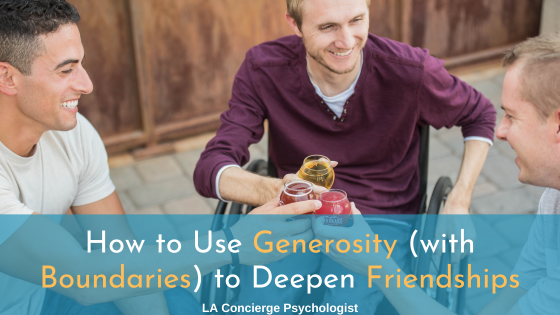This article is the first in a two-part series on parents enabling young adults. Read Part 2—How To Support Young Adult Children (Without Enabling Them)—for more information.
Are you worried that you may be “enabling” your teenager or young adult? Perhaps a friend, counselor, or family member has warned you against “enabling behaviors” or “being an enabler,” so now you’re wondering what enabling is and how it applies to parenting.
Many people first hear about the concept of enabling within the context of addiction. Enabling is indeed very common in cases of substance misuse and abuse. For example, giving money to an alcoholic may enable them to buy more liquor. However, the term “enabling” applies to many more situations than just addiction.
So, what is enabling if it isn’t just about addiction? Parental enabling is any action (or inaction) on your part that makes it easier for your child to continue unhealthy behaviors. Those behaviors could be anything from drinking too much to ditching class to shirking household chores.
Examples of parental enabling
At this point, you may be asking yourself, “Am I helping my child? Or just enabling?”
It’s complicated, and the line isn’t always clear. As therapists for young adults, we often help concerned parents distinguish between enabling vs. helping behaviors. Every situation is unique, but here are a few examples of enabling young adults we often see:
- A teenager regularly shows up late to his summer job because he stays up all night playing video games. One day, he calls his mother upset because his boss has threatened to fire him. Even though mom is in the middle of an important work project, she drops everything to call her child’s boss and smooth things over.
- A second-year college student is having some doubts about her choice of major. Instead of asking her questions about her concerns and learning about her interests, her dad lists all the practical reasons her original choice of major is still best. She has never been good with big decisions, so she defers to Dad’s opinion.
- A teen discovers that her parents have removed Tic Tok from her phone due to safety concerns. She throws the phone in anger, causing it to break. Instead of encouraging her to save up for a new one or allowing her to go without for a while, her parents immediately order a replacement.
- A high schooler who hates waking up early has been showing up late to the bus stop, causing him to miss the bus. To prevent him from getting into trouble at school, his mom takes on an increasingly active role in getting him ready by repeatedly checking on him and packing his backpack. Sometimes he still misses the bus, so she drives him to school herself. All of this causes mom to regularly show up late for work.
- A young adult moving away from home for college receives a new car as a send-off gift. His parents know he has no idea how to maintain a vehicle since they’ve always taken care of this kind of stuff. They send him a list of nearby repair shops and regularly remind him to get oil changes. A year later, they find out their son has been ignoring their instructions and that the car warranty is void due to the neglect. Since the necessary repairs are no longer covered, they feel they have no choice but to send additional funds to cover it.
Parents who enable have good intentions. In some cases, they see trouble on the horizon and want to help their children avoid it. Other times, they simply want to give their children the most abundant, happy lives possible. Unfortunately, their efforts can ultimately hurt more than they help.
Why enabling is bad for young adults in the long run
Solving a child’s problem for them may help them out today, but it generally hurts them in the long run.
One of the most harmful aspects of enablement is how it can diminish motivation. In general, people are motivated by the desire to avoid pain or to seek pleasure. A teenager who doesn’t experience much pain in life, perhaps because their parents always shield them from consequences, will have no motivation to avoid problematic behaviors. Likewise, a young adult provided with all of life’s comforts will have nothing pleasurable to strive towards.
To help illustrate this, let’s get metaphorical. Imagine that your child’s life is a boat on the river heading toward independent adulthood. To help your child make faster progress, you hop in and start rowing (i.e., enabling). Despite your exertion, you realize the boat isn’t going any faster. You look back, and, to your dismay, you see that your child isn’t even rowing. They’re just sitting there enjoying the view.
Why aren’t they rowing? Because they don’t need to. They can see that they’re already moving along just fine without putting in any work. So, even though you might have thought you were helping by picking up an oar, you were taking away your child’s motivation to propel themselves forward.
Signing yourself up for rowing duties can also create problems when your child’s boat encounters obstacles. Imagine that you see a rapid up ahead. It’s a smallish one, but you imagine all the terrible things that could happen if your child doesn’t handle it well. What if the boat is damaged? What if it capsizes and your child is hurt? To avoid these risks, you take the oars from your child and steer them clear of danger.
You saved your child from this set of rapids. But what will happen when they encounter even bigger rapids down the river, and you’re not around to help? Your child probably won’t know how to handle it. They will panic and be much more likely to make a dangerous mistake. They might even decide to pull to shore and postpone their journey downriver.
The other problem with doing all the rowing (i.e., enabling a young adult) is that it’s exhausting. Every minute you spend steering your child’s vessel is another minute you can’t spend tending to your own life journey. You end up burned out and—if your child doesn’t appreciate your sacrifices—resentful, too.
Enabling young adults is a common obstacle for parents
You may be starting to recognize how your attempts to help your child could actually hurt them later in life. Before you start blaming yourself, though, you should consider just how common this is. Nearly every parent grappled with the question “am I helping or enabling?” at some point, so it doesn’t mean you’re a bad parent.
The temptation to enable is perfectly natural, understandable, and even admirable. Here’s why:
You love your child! Enabling behaviors typically come from a place of love and compassion—a desire to protect your child and help them succeed. No one can fault you for wanting your child to live their best, happiest life.
Rescuing is instinctual. When your toddler wanders too close to a busy street, you don’t stop and question whether to intervene. You jump into action! If parents didn’t have this knee-jerk reaction to threats, we probably wouldn’t have survived as a species. It’s not as if you’re trying to be an enabler. You’re just following your instincts.
You don’t realize what you’re doing. There is a fine line between enabling young adults and helping them. If you’re not paying close attention, you’ll unintentionally cross it. When your child is in trouble, you’re probably so focused on how to solve the current problem that you fail to consider how your help could backfire. You’re enabling, but you don’t even know it.
You don’t want to rock the boat. It’s healthy for young adults to begin to pull away from their parents and explore their independence. If you’re like many parents, the relationship between you and your child may be turbulent or distant right now. To preserve it, you avoid confronting your child about their self-destructive behaviors.
Many parents fall into the trap of enabling young adult children, so you’re not alone. You don’t have to beat yourself up about it, but you do need to change your approach if you want to set your child up for long-term success.
Get Professional Guidance to Help Move Your Child Towards Independence
As “failure to launch” and adolescent specialists, we are experts in helping families with children who are struggling to transition to full-fledged independence. With our guidance, we can help you learn how to support your child without enabling them. Send us a message to see how we can help or book a free 20 minute consultation with one of our specialists:, Dr. Barajas or Dr. Goldman.



